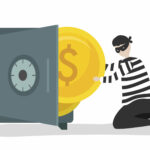Blockchain wallets provide individuals with a system for securely storing and exchanging cryptocurrencies. There are two primary categories of wallets – hot wallets which access cryptocurrency through the internet but carry security risks, and cold wallets which store coins offline.
This wallet uses public and private keys to secure transactions. With low transaction fees and support for multiple currencies, users can perform easy currency conversions.
It stores a record of transactions
Blockchain wallets are software programs that enable users to buy and sell cryptocurrencies while tracking transactions and balance. Unlike traditional wallets, however, blockchain wallets don’t store actual cryptocurrency units but instead record all transactions along with public and private keys for users’ identities and maintain high levels of security to safeguard user’s identities and maintain their privacy.
In order to complete a transaction, users must first sign their wallet with their private key and send this signature out into the network for verifiers to review before recording in a publicly accessible ledger. Furthermore, wallets store both public keys that allow others to send coins into them, and private keys that remain secret allowing only its owner access into it.
Based on how it’s being used, a blockchain wallet can be classified either hot or cold. Hot wallets are usually web-based wallets accessible on computers or mobile devices that make using cryptocurrency easier; however they may also be vulnerable to hacking attempts. Cold wallets on the other hand are hardware devices stored offline that aren’t connected to the internet – examples being Trezor and Ledger devices.
Blockchain wallets offer several advantages over bank accounts, including lower transaction fees, greater security measures and easier signup procedures compared to bank accounts that often require extensive documentation and verification processes. Unfortunately, however, they still face low acceptance and limited networks.
Users have their choice of various blockchain wallets available, so selecting one that best meets their needs is essential. They should take into account whether their chosen cryptocurrency can be traded and features that make integration easy with trading platforms as well as managing it efficiently.
Last but not least, a blockchain wallet should be simple and intuitive for its user, and foremost secure. Users should store their private keys securely within password-protected folders or emails and regularly backup their data as losing private keys could mean not being able to access cryptocurrencies as well as possible theft.
It is secure
Blockchain wallets provide a safe way of storing cryptocurrency, and make payments more quickly and cheaper than banks. Furthermore, they protect money from being stolen. A blockchain wallet is composed of software containing private and public keys as well as transaction records on a blockchain database; such wallets play a crucial part in Bitcoin and other cryptocurrencies’ cryptographic system.
Your private key in a crypto wallet serves as your account password; never share it with anyone as this establishes who the owner of your coins are. A public key serves as a sort of email address used for sending transactions – making it essential to select a secure wallet and back up your private key regularly.
There are various kinds of wallets on the market, ranging from software-based solutions to physical devices that securely store private keys offline. Your choice will ultimately depend on your needs and preferences; hot wallets carry greater risks while cold ones offer increased protection but may be less user-friendly.
Utilizing a blockchain wallet provides greater security than storing cryptocurrencies in an exchange, where hackers can attack multiple points of failure and cause significant loss. Furthermore, no transfer can take place without first authenticating both parties by matching private keys; blockchain wallets offer this single point of truth solution and therefore make excellent solutions to this problem.
Blockchain wallets not only offer security benefits, but also many other advantages that make them an excellent long-term storage option. These advantages include lower transaction fees and the ability to manage various types of cryptocurrencies in one location as well as instantaneous transactions. To protect your crypto, make sure that it is always backed up and two-factor authentication is employed and antivirus programs should run on all computers and mobile devices that access your wallet.
It is easy to use
Blockchain wallets are programs or devices that enable users to secure, easily exchange and store various cryptocurrencies such as Bitcoin and Ethereum. Transactions are cryptographically signed, making the transactions safe. Accessible from web devices like smartphones and laptops, the best blockchain wallets provide privacy as well as identity protection while supporting multiple assets with seamless integration with crypto exchanges.
Blockchain wallets record your transactions and how they were performed using keys known as private keys, similar to passwords. A private key gives access to your cryptocurrency deposits; be wary if anyone gains access to it as they could gain control. Furthermore, keeping it secret should help avoid losing it altogether – should this occur it may be wiser to move deposits to a different blockchain wallet immediately.
Blockchain wallets differ from traditional custodial wallets in that they do not rely on custodianship for transactions; rather they use public and private keys for authorizing them. When sending coins out the blockchain network verifies and records it into your account balance; you can even transfer cryptocurrency without them needing an address of their own.
Blockchain wallets also enable borderless transactions, eliminating both costs and inconvenience of currency conversion. By eliminating middlemen in transactions, they make transactions faster and more secure.
Some blockchain wallets allow you to transfer cryptocurrency between wallets. This feature can be particularly helpful for individuals holding multiple cryptocurrencies as it helps eliminate the need to exchange them manually. However, please keep in mind that not all blockchain wallets support this function.
If you are considering using a blockchain wallet, make sure it supports the type of cryptocurrency you intend to invest in and select one that’s mobile-friendly and supports multiple operating systems. When considering security, one way of protecting it could be using a backup seed phrase; that way you could recover your wallet in case of data loss. Alternatively, hardware wallets (similar to USB sticks) offer another effective defense mechanism against hackers and can provide even greater protection.
It is scalable
Scalability of blockchain technology is of utmost importance in modern cryptography. It ensures fast transactions, data security and lower transactional costs for all blockchain users; plus it enables new businesses to leverage this emerging tech for their products and services.
Blockchain wallet is a software app or device that enables individuals to store and transact cryptocurrency such as Bitcoin and Ethereum securely and efficiently. These wallets use private/public keys to control access to digital assets more securely than traditional banking methods; two forms exist – hot wallets and cold wallets.
Hot wallets have higher security risks, while cold ones provide greater protection from hackers. Both types are suitable for daily transactions; one should compare fees associated with each before selecting their preferred type. When selecting a blockchain wallet, one should also take into account which services it supports as well as integration and accessibility factors.
Cryptocurrency wallets provide an efficient solution to this problem by tracking transactions, thus minimizing theft or loss. They’re also easier to use than traditional wallets which typically require bank accounts and ID to operate.
Blockchain wallets also boast lower transaction fees compared to traditional banks, making fund transfers cheaper and without intermediaries or barriers. Furthermore, you can make multiple cryptocurrency transactions and currency conversions using them; their convenience has made them immensely popular and an essential tool for purchasing or trading cryptocurrencies. Moreover, you can use them to store all your transaction history and spending habits in one convenient location, providing an overview of progress toward meeting financial goals or altering spending behaviors as needed.



